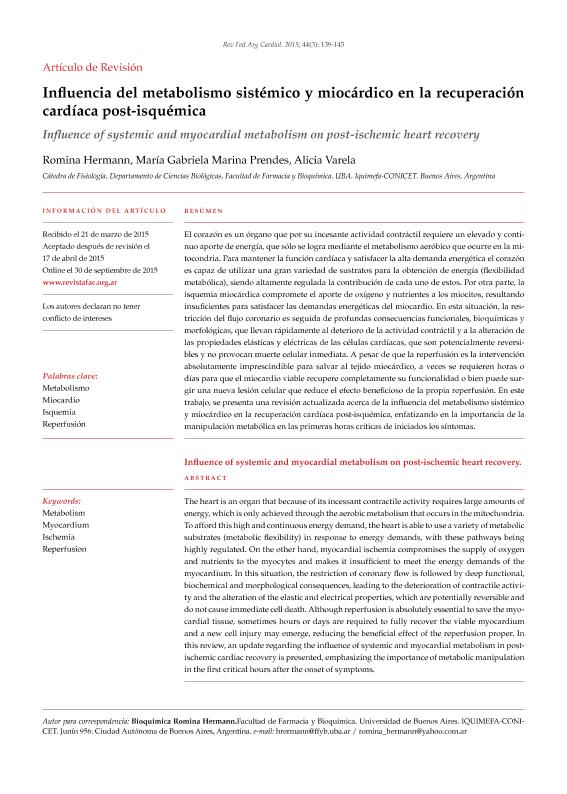Artículo
El corazón es un órgano que por su incesante actividad contráctil requiere un elevado y continuoaporte de energía, que sólo se logra mediante el metabolismo aeróbico que ocurre en la mitocondria.Para mantener la función cardíaca y satisfacer la alta demanda energética el corazónes capaz de utilizar una gran variedad de sustratos para la obtención de energía (flexibilidadmetabólica), siendo altamente regulada la contribución de cada uno de estos. Por otra parte, laisquemia miocárdica compromete el aporte de oxígeno y nutrientes a los miocitos, resultandoinsuficientes para satisfacer las demandas energéticas del miocardio. En esta situación, la restriccióndel flujo coronario es seguida de profundas consecuencias funcionales, bioquímicas ymorfológicas, que llevan rápidamente al deterioro de la actividad contráctil y a la alteración delas propiedades elásticas y eléctricas de las células cardíacas, que son potencialmente reversiblesy no provocan muerte celular inmediata. A pesar de que la reperfusión es la intervenciónabsolutamente imprescindible para salvar al tejido miocárdico, a veces se requieren horas odías para que el miocardio viable recupere completamente su funcionalidad o bien puede surgiruna nueva lesión celular que reduce el efecto beneficioso de la propia reperfusión. En estetrabajo, se presenta una revisión actualizada acerca de la influencia del metabolismo sistémicoy miocárdico en la recuperación cardíaca post-isquémica, enfatizando en la importancia de lamanipulación metabólica en las primeras horas críticas de iniciados los síntomas. The heart is an organ that because of its incessant contractile activity requires large amounts of energy, which is only achieved through the aerobic metabolism that occurs in the mitochondria. To afford this high and continuous energy demand, the heart is able to use a variety of metabolic substrates (metabolic flexibility) in response to energy demands, with these pathways being highly regulated. On the other hand, myocardial ischemia compromises the supply of oxygen and nutrients to the myocytes and makes it insufficient to meet the energy demands of the myocardium. In this situation, the restriction of coronary flow is followed by deep functional, biochemical and morphological consequences, leading to the deterioration of contractile activity and the alteration of the elastic and electrical properties, which are potentially reversible and do not cause immediate cell death. Although reperfusion is absolutely essential to save the myocardial tissue, sometimes hours or days are required to fully recover the viable myocardium and a new cell injury may emerge, reducing the beneficial effect of the reperfusion proper. In this review, an update regarding the influence of systemic and myocardial metabolism in postischemic cardiac recovery is presented, emphasizing the importance of metabolic manipulation in the first critical hours after the onset of symptoms.
Influencia del metabolismo sistémico y miocárdico en la recuperación cardíaca post-isquémica
Título:
Influence of systemic and myocardial metabolism on post-ischemic heart recovery
Fecha de publicación:
09/2015
Editorial:
Federación Argentina de Cardiología
Revista:
Revista de la Federación Argentina de Cardiología
ISSN:
1666-5694
Idioma:
Español
Tipo de recurso:
Artículo publicado
Clasificación temática:
Resumen
Palabras clave:
ISQUEMIA
,
REPERFUSIÓN
,
MIOCARDIO
,
METABOLISMO
Archivos asociados
Licencia
Identificadores
Colecciones
Articulos(IQUIMEFA)
Articulos de INST.QUIMICA Y METABOLISMO DEL FARMACO (I)
Articulos de INST.QUIMICA Y METABOLISMO DEL FARMACO (I)
Articulos(OCA HOUSSAY)
Articulos de OFICINA DE COORDINACION ADMINISTRATIVA HOUSSAY
Articulos de OFICINA DE COORDINACION ADMINISTRATIVA HOUSSAY
Citación
Hermann, Romina; Marina Prendes, María Gabriela; Varela, Alicia; Influencia del metabolismo sistémico y miocárdico en la recuperación cardíaca post-isquémica; Federación Argentina de Cardiología; Revista de la Federación Argentina de Cardiología; 44; 3; 9-2015; 139-145
Compartir




